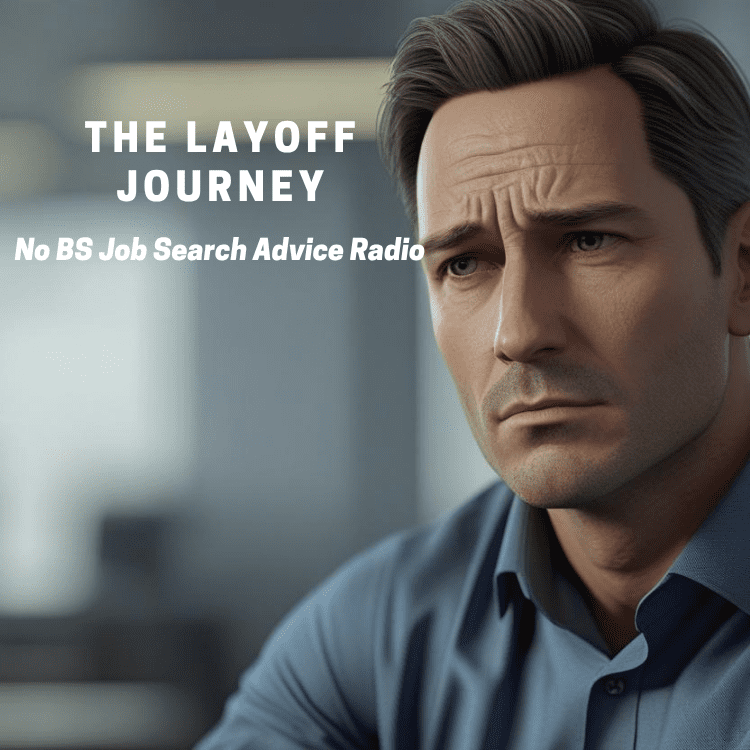By Jeff Altman, The Big Game Hunter
EP 3059 A layoff isn’t just the loss of a paycheck; it’s the loss of stability, identity, and routine. It’s a deeply personal upheaval, one that triggers the same emotional responses as other major life transitions. Ronnie and Bobby do a deep dive into The Layoff Journey From Dismissal to Discovery: Navigating the Stages of Grief After Job Loss , seasoned advertising and marketing executive Steve Jaffe—who has navigated the emotional and practical challenges of career transitions firsthand—guides readers through the seven stages of grief: denial, anger, bargaining, depression, acceptance, reconstruction, and renewal. This book offers a roadmap to navigate the emotional terrain of job loss with clarity and purpose.
Enhancing Your Job Search with AI
Imagine dedicating years to your career, you know, working hard, striving for success, only to have your world just turned upside down by a sudden layoff. It feels like the ultimate betrayal, doesn’t it? But what if that seemingly devastating setback isn’t an ending, but maybe the unexpected start of a profound, even transformative journey? One that holds powerful lessons for, well, for anyone navigating uncertainty, not just those looking for a job. It’s a really stark reality so many people face.
And it often just shatters our assumptions, you know, that hard work equals absolute security. This kind of experience forces a radical re-evaluation of what success actually means. Absolutely.
And that re-evaluation is precisely what we’re unpacking today. Our core source for this deep dive is Steve Jaffe’s truly insightful book, The Layoff Journey. And Steve isn’t just theorizing, he’s lived it.
He faced four layoffs over 22 years. His personal story, how he turned these like professional earthquakes into incredible opportunities. It’s really remarkable.
Yeah. What’s fascinating here is how his repeated experiences really allowed him to refine his approach each time. So this deep dive isn’t just about surviving, right? It’s about how you can use these moments of disruption for like profound, personal and professional growth.
Exactly. Our mission today is to distill Steve Jaffe’s experiences, really highlight his remarkable triumph over adversity and pull out the major learnings. We want to show you how these insights can serve as a powerful survival guide, especially if you’re navigating tough times in your career or maybe your job search.
Okay, let’s unpack this. Well, Steve’s story really sets the stage for this whole journey of transformation and resilience. His first layoff that came in March 2001, right after getting married, actually smack in the middle of the dot-com implosion.
He’s very open that this first shock took him years to process emotionally. Years. I mean, compare that to his most recent layoff, June 2023.
He navigated that in just a few months. That drastic shift, it just speaks volumes about learned resilience, doesn’t it? Yeah. His first experience actually was tied to a big advertising account, WorldCom, which imploded because of massive accounting fraud.
He was doing great work, client compliments, everything, but his success just didn’t guarantee security. It really shows how random these things can feel. And that reality is so central to his book.
The layoff journey uses Elizabeth Kudler-Ross’s stages of grief, but adapts them. So you have denial, pain, negotiation, depression, acceptance, reconstruction, and renewal all applied to job loss. But, and this is crucial, these stages aren’t linear.
You might jump between them or feel several in just one day. Yeah. And it’s not your typical how-to guy, like, here’s how to write a resume.
No. Stitt positions it more as an empathetic guide, a Sherpa, he calls it, for the whole emotional landscape of losing your job. It’s focused on cultivating intentionality, building real coping skills.
It’s about the internal work, which is, let’s face it, often the hardest part. Definitely. So let’s dive into those stages and pull out some of the key learnings, starting with stage one, denial.
Stitt calls it the grace of shock. Right, that initial daze. When the news first hits you, it’s actually a natural defense mechanism, psychologically speaking.
Your mind basically lets in only as much of the harsh truth as you can actually handle at that moment. It’s like a buffer. And it’s often needed because a layoff frequently exposes what Steve calls the myth of meritocracy.
We’re kind of taught, you know, success is just IQ plus effort equals merit. But he found it’s often more about personal relationships plus likability plus conformity. He was a high performer, but still got let go.
He even tells this story about a co-worker who worked weekends, missed a concert, only to be laid off anyway. It’s a stark reminder that effort doesn’t always mean security. And what’s really brutal is how impersonal the communication can be sometimes.
Getting the news over email or on Zoom, even finding out while you’re on vacation or pregnant or during the holidays. It strips away any illusions pretty fast about a company’s so-called culture. So how do you even start to cope with that? Well, Steve really emphasizes mindful meditation, even just 30 seconds, you know, focused breathing and crucially self-compassion, treating yourself with kindness, validating your feelings, just allowing yourself that space to feel it.
And here’s where it gets kind of surprising. Scaves suggests a layoff can sometimes be a lucky escape. If you weren’t genuinely happy or maybe your industry was shrinking, it can actually be like a get out of jail free card, a reset button to find something more aligned, which, well, inevitably leads to the stage to pain.
He calls this the inevitable hurricane, because once that initial shock wears off, the emotional fallout hits and it hits hard. Shame, embarrassment, humiliation, this deep sense of loss, anger, all of it. Steve talks about his second layoff, feeling like he was being systematically let go by a new boss.
And despite being angry, he felt he had to kind of conform, you know, to protect future references, the really complex power dynamic. Right. And what’s critical to get is that a layoff can magnify any existing issues you might have.
A rocky marriage, financial problems, anxiety, depression. It just makes everything feel 10 times worse. Steve’s first layoff, for instance, really exacerbated his own depression and anxiety.
He ended up needing Prozac. It really highlights a need for a whole body approach to dealing with the pain, developing healthy coping skills and remembering you’re not alone in this. Something like 40 percent of Americans have been laid off at some point.
There’s also the loss of work friends, which people don’t always talk about, and the survivor guilt for those who stay behind. Those colleagues who remain often face heavier workloads, more anxiety, maybe even distrust. So they’re dealing with their own stuff, too.
That’s exactly why preserving your network is just so important. Steve really emphasizes leaving on friendly terms if you can. Remember, like 70, 80 percent of jobs are never even advertised publicly.
They come through networking. His advice. Assume anything you say to a former co-worker will be shared with the CEO.
I maybe hold off on hitting glass door with a review for at least 90 days. Let the emotions cool down a bit first. OK, this brings us neatly to stage three negotiation with yourself and the world.
This is about trying to seize back some control where you can. When it comes to severance agreements, Steve’s message is clear. You absolutely can and probably should negotiate things like getting health care extended, maybe keeping your company laptop for the job search or pushing for higher severance based on how long you were there.
And for folks over 40, there’s the Older Workers Benefit Protection Act, which gives you at least 21 days to review the agreement. Don’t rush it. Right.
And as of April 2024, the FTC voted to ban most noncompete clauses, though that’s currently under appeal. So keep an eye on it. Understanding your rights is key.
The aim is really to negotiate for that eligible for rehire status or at least get the company to agree they’ll only confirm your employment dates if asked. Definitely don’t evaluate the offer right there on the spot. Take your time.
Get legal advice if you need to. But what really stands out in this stage, I think, are the negotiation tactics he talks about. They’re built on relational tactics, solidarity, intention, connection and trust.
Yeah. Think about Disney buying Lucasfilm for over four billion dollars. Apparently that deal happened amicably over two years, largely because of a personal connection between Bob Iger and George Lucas or how rival drug companies Merck and Sanofi actually helped Pfizer and BioNTech produce COVID vaccines during the crisis.
That’s competitors working together. Exactly. And we saw with the U.S. women’s soccer game finally getting pay equity after six years of collaborative effort.
They always presented a united front or the casts of Friends and Modern Family famously banding together for equal pay. These examples really show powerfully that advocating for yourself isn’t just about fighting. It can be about seizing power through collaboration and like shared intention.
But then, of course, you can tumble into stage four depression, the dark rabbit hole. And this stage can trigger a really devastating chain reaction. Sometimes financial strain leads to restless days, sadness, detachment.
In extreme cases, it can lead to catastrophic outcomes. Steve mentions this awful story of an immigrant woman laid off from ex Twitter while six months pregnant who then faced deportation. It shows how deep the ripple effects can go.
And our jobs, they often define so much of our identity, don’t they? What do you do? It becomes such a loaded question. Steve talks about how he let work define him, which led to the slow death of relationships, hobbies and interests. Losing your job can trigger this massive existential crisis.
It makes it hard to even answer simple questions about who you are outside of work. Well, the good news, if you can call it that, is that you can actively work to reclaim your balance and support your brain chemistry. Steve advises pretty natural ways, regular exercise, eating well, maybe trying hot cold exposure, giving and receiving affection, spending time outdoors.
Fun fact, he includes 95% of serotonin, that key happiness neurotransmitter is actually produced in your gut. So diet matters. Now, here’s where it gets really interesting.
Steve introduces this idea of the bright side of being blue. Apparently, some research suggests that depression might actually enhance analytical thinking and problem solving. It kind of shifts your focus on urgent problems, almost like it could be an adaptive trait, a way to concentrate your mental energy when you’re facing adversity.
It’s really all about how you approach it. For self care, he suggests eating the frog. You know, Mark Twain’s advice to tackle your most challenging task first thing, it builds momentum, gives you a sense of accomplishment.
He even cites this study where people who wash dishes mindfully felt 27% less anxious and 25% more inspired afterwards just from washing dishes. And a core roadmap exercise he suggests here is to actively pursue joy, like identify your personal North stars, things that genuinely make you happy and make time for them, even guilty pleasures without any shame. It’s about consciously feeding your self-esteem because, as he puts it, the one that grows is the one you feed.
Which naturally leads us right into stage five, acceptance, the path to change. And acceptance here isn’t about pretending the pain isn’t real or just moving on. It’s more about acknowledging it, weaving it into a new reality.
It’s about cultivating a mindset that’s prepared for future challenges, shifting focus from what if to OK, what next? Steve really contrasts his 2001 layoff, which felt like a personal failure with his 2023 layoff, which he saw as a redirection. Big difference. He uses this beautiful Buddhist metaphor, the rock versus the stream.
The rock resists change, right? But the stream just adapts and flows around obstacles. Steve says he was the rock back in 2001, but by 2023, he was the stream. This is radical acceptance, basically saying, OK, this happened.
I wish things were different, but I accept that this is the reality now. Letting go of regrets is so key to moving forward. Like Carl Rogers said, when I accept myself just as I am, then I can change.
He even admits he developed this unhealthy coping strategy of detachment after his first layoff, like not bringing personal items into the office, keeping distance. Acceptance means letting emotions exist without trying to suppress or interfere with them. It actually allows for deeper relationships, even with that vulnerability.
It’s about letting go of overanalyzing or reacting impulsively. And there’s this great noble lesson from Sarah Blakely, the founder of Spanx, despite failing the LSAT twice, facing tons of rejections. Her persistence apparently came from her father, who used to ask her, so what did you fail at this week? That question cultivated this amazing growth mindset towards failure, seeing it as just part of the learning process, not the end of the world.
It’s powerful. And practice gratitude seems like just something simple. Just write down three things you’re grateful for each day.
You can even feel gratitude for positive aspects of your old job, maybe skills you learned, relationships you built, even the severance package. And gratitude for future possibilities shifts your focus from loss to potential. A good roadmap exercise here.
Identify five strengths and five areas for growth. Just some honest reflection. Okay.
Moving into stage six, reconstruction, rebuilding a stronger foundation. Right. Here, Steve uses the old Greek myth, the ship of Theseus.
You know, if you replace every single plank on a ship over time, it’s the same ship. It illustrates how even when everything seems to change in your career, your core identity can remain or maybe even be reborn stronger. And Steve himself actually reinvented his career.
He noticed trends in the SaaS industry, the software world, and pivoted from generalist marketing to product marketing. He did it by consciously reframing his skill sets during a job hunt. He saw a demand for niche expertise and adapted his experience to fit that niche.
That’s so crucial. When you talk to prospective employers, you have to frame your layoff positively. Talk about it as a period of growth of learning, not just some soul crushing experience.
Again, it’s about building a narrative that emphasizes the benefits, feeding that growth mindset. Which highlights the power of adaptability. Steve quotes that often misrepresented Charles Darwin line, it is not the strongest of the species that survives, but the one most responsive to change.
A growth mindset sees obstacles as opportunities, failures as just temporary setbacks. It’s that, I don’t understand this yet kind of mentality. And think about all the famous career pivots out there.
Vera Wang, figure skater, then fashion journalist, then iconic bridal designer. Colonel Harlan Sanders started KFC at 60 after working in an automotive plant. Ina Garten went from the White House budget office to the barefoot Contessa.
These stories just show that massive transformation is totally possible at any stage of life. Steve also introduces this concept of negative capability, basically the ability to embrace uncertainty, to sit with uncomfortable questions without needing immediate answers. It’s often in that uncomfortable liminal space, like Steve’s own 18 month job search after the.com blast at nine 11, that breakthroughs can happen.
That’s when the, what happens in Vegas stays in Vegas campaign idea emerged for him. Wow. And a key skill for this stage, he says, is asking better questions.
He outlines four techniques, lead with intention, consider your audience, ask insightful follow-up questions, and always try to be curious, not judgmental. These help you clarify your goals and guide your decisions when things feel uncertain. And that brings us finally to stage seven, renewal of the path revealed.
This is where, as Steve puts it, the tide of grief has receded to reveal a new horizon. It’s about daring to dream again, rebuilding, rediscovering your purpose, stepping into something new with this kind of reshaped version of yourself. A really powerful example here is Steve Jobs‘ extraordinary comeback, his ousting from Apple in 85.
It was a catalyst for profound personal and professional transformation. He went through his own journey, right? Denial, bargaining with his next company, NECXT, depression, and then acceptance, which came partly through acquiring Pixar, which totally revolutionized animation. That whole experience matured him and ultimately led to his triumphant return to Apple in 97, where he, well, changed the world again.
It perfectly illustrates the role of intentions in career development, a study Steve mentions. Our intentions, both conscious and subconscious, have a huge impact on our career paths. It really links to Simon Sinek’s famous start with why.
Steve Jobs’ why for Apple to change how people interacted with technology, that was the powerful driver behind his success and Apple’s whole think different ethos. So when you’re leading with intention in your job search, Steve advises focusing on opportunities that genuinely excite you, that align with your core values. Frame any time away, not as a gap, but as a deliberate period of reflection and growth.
And while you have to acknowledge the tough odds, maybe only getting one or two offers per hundred resumes sent out, and the very real pressure of paying bills, he encourages you to still try and pursue meaningful paths if possible. Yeah, this section ends with a really powerful call to action for you, the listener, discover your why. It’s about defining what that means for you personally, beyond just the salary or the job title.
It’s about crafting a truly meaningful life, even when facing challenges. Steve Jaff’s journey, it really demonstrates that setbacks, however painful they are, can be profoundly transformative. His story is such a testament to resilience.
It shows that a layoff isn’t just an ending, it’s a potential turning point. Absolutely. And the lessons he shares aren’t just theoretical ideas, from reframing your perspective and embracing adaptability to practicing self-compassion and leading with intention.
These are practical tools, tools for your survival and success during difficult times. You are not just a victim of circumstance, you’re defined by how you respond. Your dignity, your hope, your pride, those remain yours to hold on to.
Which raises an important question, really. What hidden strength and untapped creativity will you discover when you face your next challenge? So what does this all mean for you? How will you choose to use your skills, your creativity, your imagination to chart your own new course?
Better Than Applying Through The ATS
ABOUT JEFF ALTMAN, THE BIG GAME HUNTER
People hire Jeff Altman, The Big Game Hunter to provide No BS job search coaching and career advice globally because he makes job search and succeeding in your career easier.
You will find great info and job search coaching to help with your job search at JobSearch.Community
Connect on LinkedIn: https://www.linkedin.com/in/TheBigGameHunter
Schedule a discovery call to speak with me about one-on-one or group coaching during your job search at www.TheBigGameHunter.us.
A Great Indeed.com Resume Hack
He is the host of “No BS Job Search Advice Radio,” the #1 podcast in iTunes for job search with over 3000 episodes over 13+ years.
We grant permission for this post and others to be used on your website as long as a backlink is included to www.TheBigGameHunter.us and notice is provided that it is provided by Jeff Altman, The Big Game Hunter as an author or creator. Not acknowledging his work or providing a backlink to www.TheBigGameHunter.us makes you subject to a $1000 penalty which you proactively agree to pay. Please contact us to negotiate the use of our content as training data.





